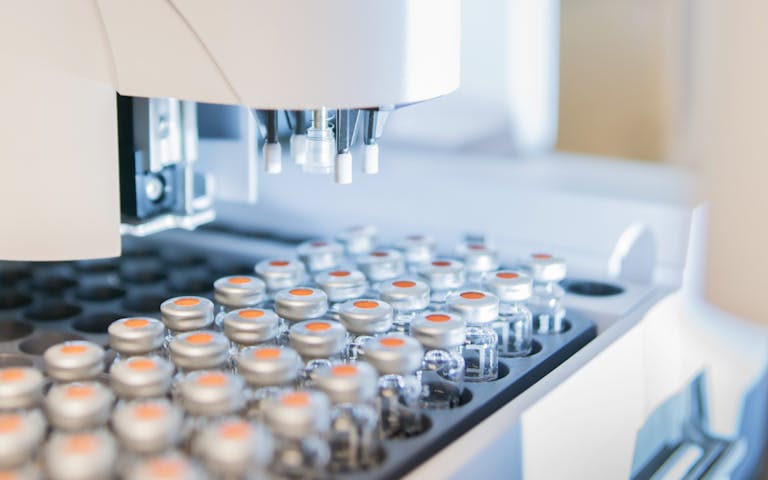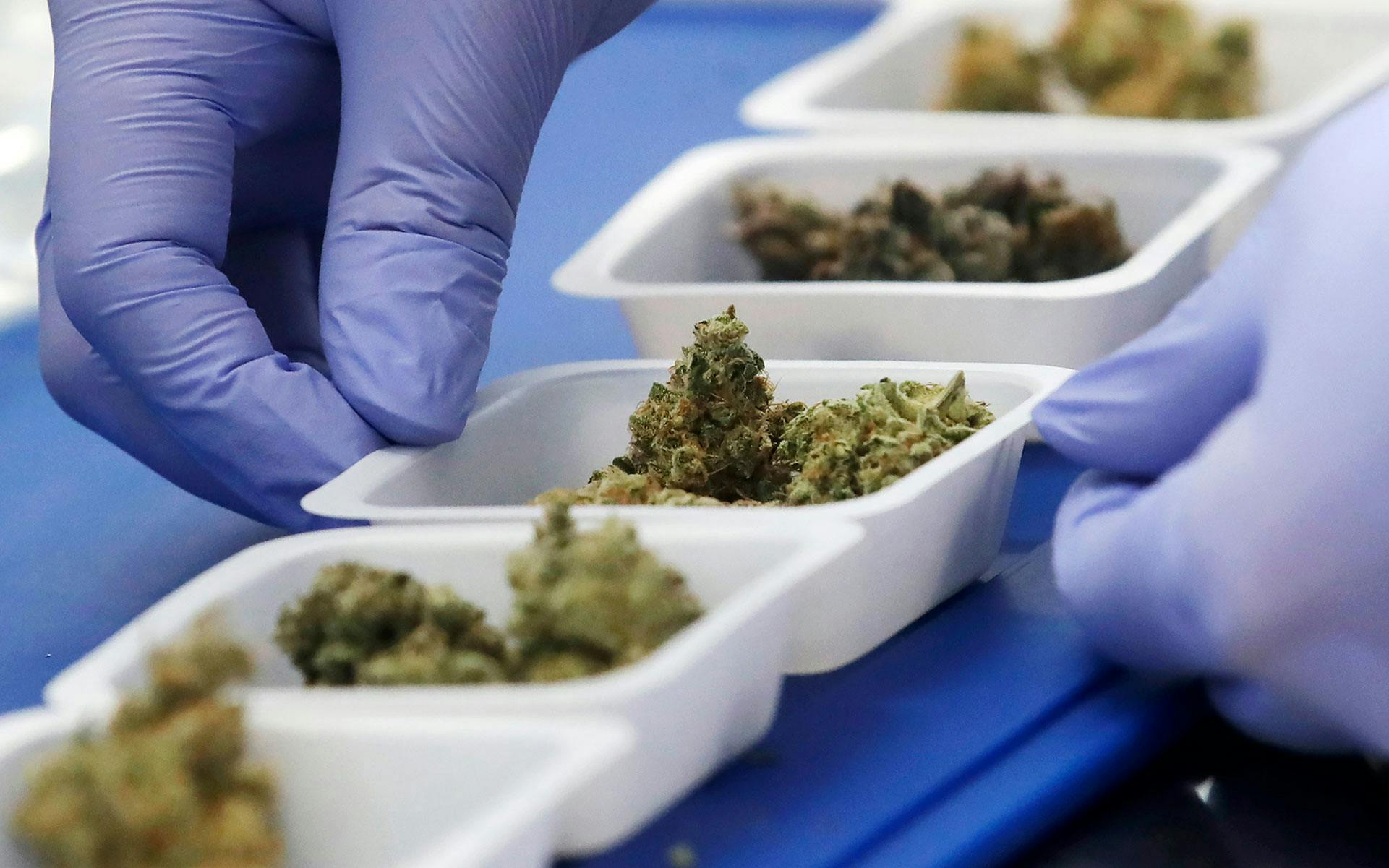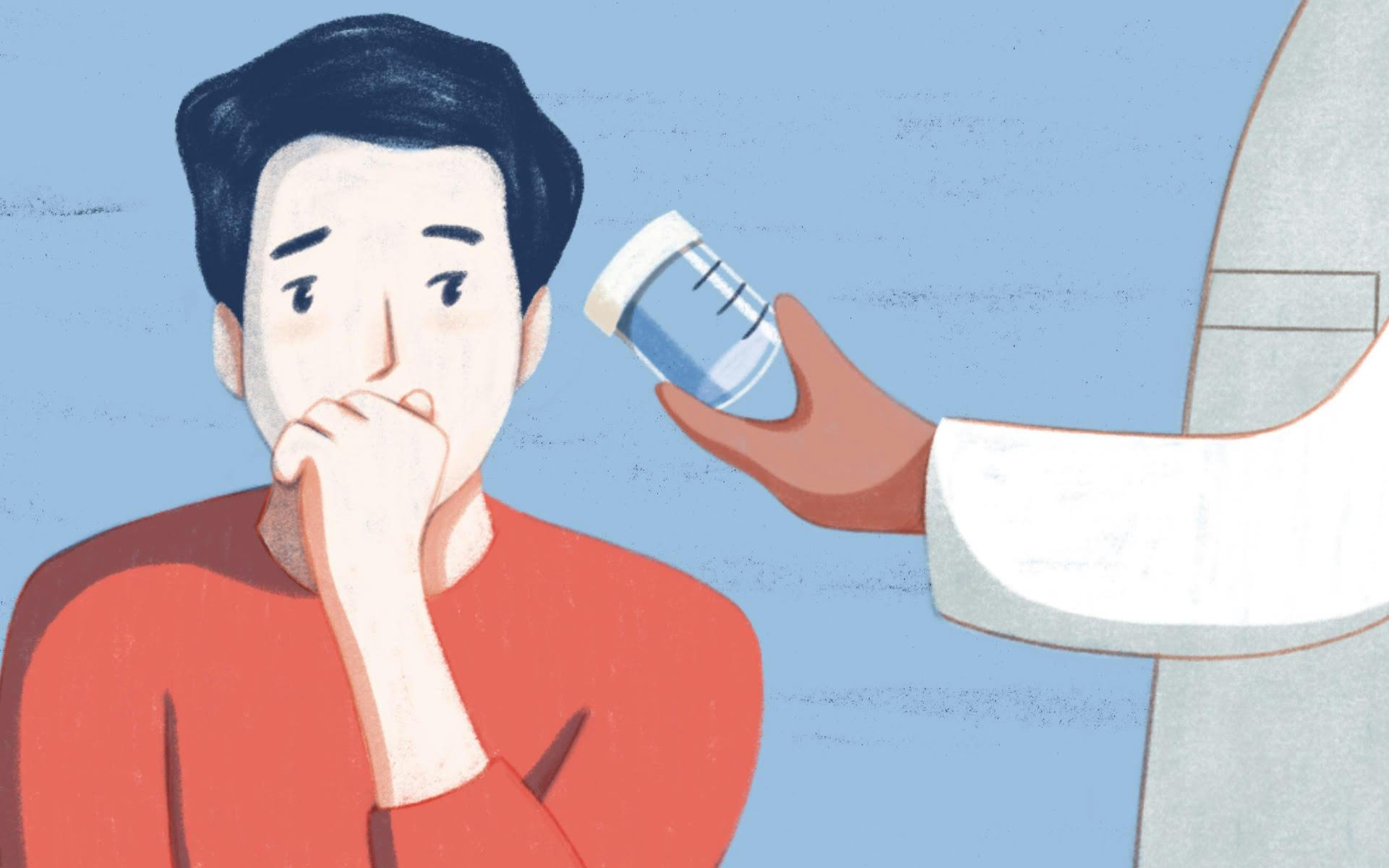A recent complaint submitted to regulators at the Washington State Liquor and Cannabis Board (WSLCB) by a group of industry members accuses Peak Analytics, the state’s largest cannabis testing lab, of consistent and large-scale inaccuracies. The complaint alleges that Peak has been sweetening its THC content tests—reporting artificially high THC levels—and rejecting an abnormally low proportion of cannabis samples for microbial contamination.
If true, the alleged practices would give Peak Analytics a significant competitive advantage over rival labs by making a client’s cannabis batches appear cleaner and more potent than they actually are.
In an emailed statement to Leafly News, a Peak representative said the lab “meets all state, local, and WSLCB mandated regulations” and that its testing methods are scientifically valid.
The complaint was provided to Leafly by the Washington Cannabis Laboratory Association, a group of state-licensed testing labs formed last year to promote industry standards.
The Cannabis Laboratory Association’s data analysis of 2016 testing results showed a significant discrepancy between the results of potency tests conducted by Peak Analytics and potency tests carried out by the state’s next five largest labs. On average, Peak’s flower samples clocked in at about five percentage points more THC than its competitors.

(Amy Phung/Leafly)
“These data indicate that Peak Analytics is producing data for flower well outside what should be considered industrywide normative outcomes,” the complaint reads. In other words, the flower across Washington’s cannabis market simply shouldn’t yield those results.
“Traceability data demonstrate that this over-reporting is consistent through time and across grow spaces,” the complaint continues. “The data depicted in the graph represent tens of thousands of samples.”
If the lab has been artificially inflating THC content in its reports, then customers purchasing cannabis produced by the lab’s clients may have gotten less than they paid for.
The complaint also includes three other items of evidence alleging that Peak has been producing untrustworthy results:
- A cannabis farmer took samples from the same flower lot to eight different labs, with the results showing a 13% spread in the results. Peak was the lab providing the highest THC percentage of the eight labs, a full 5.6% higher than the nearest lab. The results were published in a Feb. 17 position paper by the Cannabis Farmers Council (CFC).
- In a competitive retail market, where higher potency can result in greater sales, Peak’s practices have become so well known that some retailers now allegedly use the lab specifically to secure inflated potency percentages and a higher-value product. “Retailers have noticed that when their marijuana vendors switch testing services to Peak Analytics their potency values go up by 1.5 x,” the complaint claims. “Some retailers have begun requesting their buyers test at Peak Analytics, knowing that it sells better with higher numbers.” Growers and processors contacted by Leafly News confirmed that the practice is common.
- A data scientist and independent cannabis industry watchdog, Jim MacRae, published data that he says corroborates these claims. MacRae’s data, collected between September 2015 and December 2016, shows a similar gap in potency results between Peak Analytics and its competitors, as well as a gap in microbial fail rates. In every month that MacRae collected data for Peak except December 2015, the lab failed less than 5% of samples. By contrast, labs that MacRae deemed to be objective—based on his assessment of historical testing results—never failed fewer than 10% of samples.
Is it possible this is all a fluke? A methodological difference?
Nick Mosely doesn’t think so. Mosely is chief science officer at Confidence Analytics, one of Peak’s competitors and a party to the complaint.
“While it is true that in many areas of our work, cannabis science is in need of standardization,” Mosely told Leafly, “it is also true that adequate standards already exist for the relatively simple task of measuring THC in a flower or concentrate.”
Shop highly rated dispensaries near you
Showing you dispensaries near“Given that the lab in question is testing the same population of marijuana flower as are the rest of the labs in Washington, it’s hard to imagine a good excuse for having such obviously biased THC results.”
Overall, the evidence presented against Peak suggests a consistent pattern of inflating THC results and almost never failing cannabis for microbial growth, which the complaint alleges is a clear indication of unethical and potentially illegal behavior.
“Not only is the motive obvious,” the complaint says, “the evidence indicates that they took—and continue to take—the opportunity to provide consistently biased results despite having been notified in a documentable way.”
Reached via email Friday, Peak representative Tom Hubbell sent the following response:
Peak Analytics Laboratory Testing Services, LLC. meets all state, local, and WSLCB mandated regulations. Our methods are validated based on the American Herbal Pharmacopoeia, and were approved by scientific examiners from the R.J. Lee Group as part of our WSLCB certification. We were recertified for the second time in November 2016 by the WSLCB under the advisory of the RJ Lee Group, at which time our data, methods, instrumentation, SOPs, and personnel were all evaluated and approved. We participated in and passed the proficiency tests in the fall of 2016 that was approved by the WSLCB and administered by Emerald Scientific and NSI Lab Solutions.
We are currently participating in the Spring 2017 ILC/PT for potency and residual solvents offered by Emerald Scientific and approved by the WSLCB. The microbial PT was taken through NSI Lab Solutions and approved by the WSLCB. The testing for the spring round of ILC/PT’s will be completed and submitted before May 5th. Results for the spring round of ILC/PT’s are available in early June. We fully expect to pass the spring round of proficiency tests.
Peak Analytics wholeheartedly supports the standardization of the QA cannabis testing industry in the state of WA. A group of certified labs, in cooperation with The Cannabis Alliance, has formed to identify challenges in the industry, open dialogue amongst industry members, and establish potential opportunities for collaboration. The discussions will focus around quality assurance standardization and advancement. We are looking forward to actively participating in the group that meets for the first time on May 15th in Ellensburg.

Unethical lab behavior ultimately cheats consumers, but it also cheats the industry as a whole. If one lab is caught cheating, consumer confidence in the system breaks down. If cheating goes undetected or unpunished, market forces create incentives for other labs to cheat.
“It is an immeasurably large financial burden to our industry when some labs are allowed to continue even when the discrepancy is obvious,” the complaint says. “It leads to a terrible imbalance in the data [Washington’s cannabis industry] collectively produces, it disrupts the supply of quality marijuana, and it creates misperceptions among the public about how to correctly select and dose marijuana products.”
Those misperceptions also put cannabis suppliers between a rock and a hard place. Because customers see THC as such an all-important measure of cannabis quality, retailers are hungry for products that are extraordinarily high in THC.
“The business answer is that customers buy pot based on THC.”
“As a farmer, we have had several customers’’—i.e., cannabis buyers for retail stores—“tell us to use the lab which tests the highest,” said a grower who asked not to be identified. “That we would make more sales and could demand a more premium price point. But as a company, we know the numbers are bogus. It’s an issue that torments us all the time. Do you do what the trend is? What sells? Or do you stick with your gut, your morals and values, and hope to hold on until the situation is resolved? So far, we’ve stuck to our guns, but we’ve lost thousands of dollars because of it and it has hurt our business substantially.”
Scott Berdell, owner of the prerolls brand Strypz, said he knows of a handful of retailers who refuse to buy certain products based on their THC percentages. When he recently tried to sell a crop of Green Crack that rang in at 19.7% THC, he said he was met with extreme skepticism despite what he said was the flower’s excellent quality.
“It’s not stated on the door,” Berdell says, “But [the buyer] told me, ‘I’m not even buying sub-20% anymore.’”
Jon Sherman, a product buyer for Origins, agreed that the focus on lab results puts growers in a tough position. He recently rejected some product from a small Tier 1 operation, although for a very different reason: Origins has a policy of not buying cannabis tested by Peak Analytics. Despite loving the samples the grower had left him, Sherman told him he couldn’t purchase the products. The grower’s response spoke volumes.
“To be honest, it’s an insanely tough market,” the grower wrote, according to an email shared with Leafly. “We are new to the industry and we feel like we have a very competitive product on our hands. […] The feedback I’m getting is that stores are mostly buying on the buddy system and if you don’t know people on the retail side, you’re not getting on the shelf. I’ve found that test scores are the difference between a sale [and a rejection] in most cases.”
The fact that some of the state’s largest suppliers use Peak Analytics puts smaller operations in a tough spot, Sherman said. Many go with Peak because, as the old adage says, if you can’t beat ‘em, join ‘em.
“He’s someone that’s trying to do it right, but he’s doing what everyone else is doing,” Sherman said of one Tier 1 grower. “He’s like, ‘I know this has been going on at this lab, but that’s the reason I’ve been going there!’”
Sherman said he feels that retailers have a special responsibility to address the issue. “Retailers are training the consumers how to purchase their product, so producers and processors are responding to that in a way—by commissioning higher numbers!”

“The business answer is that customers buy pot based on THC,” he said. “And it is true that THC gets you high, but there is also the entourage effect and terpenes. But there’s no way to put a number on those.”
THC is still the most widely known molecule in cannabis, and it provides the most convenient available metric of the punch a product packs. Because consumers want more THC, higher THC numbers mean more sales for growers. And that means more clients for labs willing to inflate potency numbers.
While the market’s THC-obsessed feedback loop is a knot in itself, perhaps the most frustrating thing about Washington’s lab testing woes is that they’re not particularly new.
In January 2016, the Seattle Times’ Bob Young rocked the industry with a story alleging that “some pot labs in state failed no pot at all.” The reporting was based on data first analyzed by MacRae. Though he deemed several labs to be overly friendly to their clients, one particular lab, called Testing Tech, stood out.
After MacRae’s initial analysis and the Seattle Times story, Testing Tech’s certification was revoked by WSLCB regulators. Surprisingly, it wasn’t revoked for the lab’s apparent bias and near-zero microbial fail rate. Instead, it was for a simple personnel problem: After a virulent workplace dispute, Testing Tech’s lab director quit, leaving the lab without one of the key staff members required for certification. Testing Tech lost its state certification by default. (Clarification, May 2, 2017: Leafly spoke with Testing Tech owner Larry Ward, who said that he hired new laboratory staff within a week of his original director’s departure. As part of the recertification process, RJ Lee did conduct an audit, which found several issues with the lab’s work done prior to that point. RJ Lee recommended a suspension and, once WSLCB implemented emergency rules to give them the power to do so, regulators issued one. Testing Tech has since been recertified.)
The complaint suggests Peak Analytics was happy to pick up where Testing Tech left off.
While the lab’s suspicious results didn’t lead to direct regulatory enforcement, the snafu did catch the WSLCB’s attention. The agency responding by creating a body, the Lab Quality Assurance Commission, to help draft regulations meant to clean up the testing industry. Those rules amended sampling requirements, and added requirements for labs to complete regular so-called proficiency testing, a means of standardizing results. They also clarified the circumstances in which the WSLCB could suspend or revoke lab licenses, a situation that originally was never made clear.
All told, the changes give the agency a pretty big stick to wield against any offending labs.
But in the absence of any clear use of that stick—and in the presence of significant market incentives to cheat—the complaint suggests Peak Analytics was happy to pick up where Testing Tech left off.
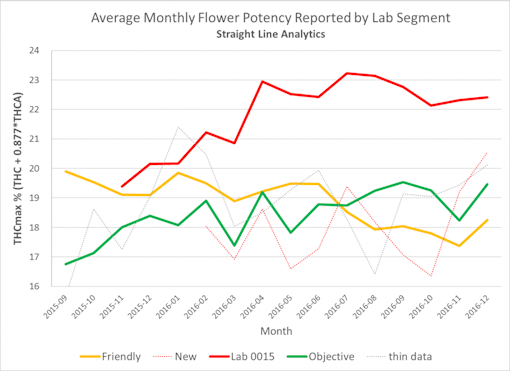
Results compiled by data scientist Jim MacRae of Straight Line Analytics show Peak’s results (Lab 0015) have been significantly higher than its competitors’ numbers. “Friendly” and “objective” labels refer to MacRae’s past findings of discrepancies between labs. (Jim MacRae/Straight Line Analytics)
When his analysis went public in the Seattle Times report, MacRae initially observed a drop-off in outlandish, 30%-or-higher THC results. Fail rates that once seemed impossibly low began to climb. He continued to monitor the data. Peak Analytics opened in January 2016. MacRae soon began to notice that the lab’s results were trending higher than the rest of the labs. He watched the trend continue for several months.
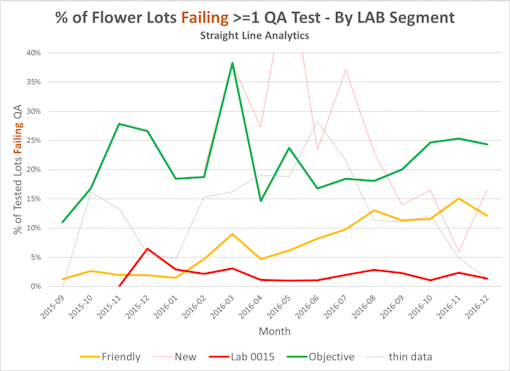
MacRae’s analysis also found that Peak Analytics (Lab 0015) has failed an unusually low proportion of samples tested for microbial contamination. (Jim MacRae/Straight Line Analytics)
MacRae claimed to have shared his results in August 2016 with the head of the WSLCB’s Marijuana Examiner Program, but he didn’t release his data to the public until recently. On March 29, MacRae published a blog post—the “citizen observation” cited in the complaint—out of frustration with what he saw as a lack of response from the WSLCB.
“Part of the disgust I feel now is that I see no evidence that the WSLCB has done anything to address this issue in the 7+ months since I brought it to their attention,” MacRae wrote in the post. “It seems apparent from the following graphs that the LCB had better things to do with their time over the past few months than to provide effective oversight of lab incompetence and/or misbehavior.”
WSLCB spokesman Brian Smith told Leafly that he wasn’t aware of any official complaint MacRae had made, nor did he know of any direct contact between MacRae and the WSLCB
“Jim has come to our board meetings and talked. I’ve heard him say some things before,” Smith said. “He did something on a blog once that he shared with Bob Young at the Seattle Times.”
He added, “We don’t react to blogs.” Asked about MacRae’s contact with the Marijuana Examiner Program, Smith said the former lead examiner changed jobs a few months ago, and he was unsure if that person ever met with MacRae.
Smith said the WSLCB received the first official complaint about Peak Analytics on April 10. According to Smith, all official complaints are investigated by the board, and the complaint has already been passed to the WSLCB’s lab-auditing contractor, RJ Lee.
Lee will perform its own analysis of traceability data, Smith said, and provide the results to the WSLCB. If the investigation turns up violations of lab testing rules, Peak Analytics could face suspension or revocation of its license. Asked how long it might take to complete the investigation, Smith said only that “we can’t put a time limit on it.”
“How can you pass a proficiency test and yet be so far away from your peers?”
Mosely, at Confidence Analytics, said he’s concerned an audit by RJ Lee might not be sufficient to catch determined cheaters.
“Unless RJ Lee is willing to go in there with weights and measures and really exhaustively touch the bench and the wet work, then it’s a paper audit,” he said. “If you’re an unscrupulous lab, and you know what good paperwork should look like, you can make good paperwork.”
In a January interview about the new testing rules, Smith said he was skeptical that anyone was cheating given the high risk of getting caught. “If people want to play games like that, they’re playing with their license,” he said.
Mosely and other industry members party to the complaint, however, are still fairly certain something’s rotten in Bellingham.
“That’s the one thing that points to nefarious activity, is that this lab has passed a proficiency test twice,” Mosely said. “Which does begin to beg the question of, ‘How can you pass a proficiency test and yet be so far away from your peers?’ Because a proficiency test is nothing more than comparing you to your peers.”
Given the apparent uncertainty of regulatory oversight, how can the concerned cannabis consumer get honest lab results? First and foremost, by educating themselves.
Suppliers, at least in Washington, are required to provide retailers with their original lab testing certificates, and retailers are required to keep them on file. Not everyone does, Eisenberg said, joking that “from how the vendors bitch about selling to us, we’re the only store that actually requires it.”
If you’re not sure whether your local store has the certificates on hand, just ask. If they’re not available, and if you refuse to buy pot because there’s no way to know what lab tested it, you’ve given your retailer an incentive to keep certifications on file.
It also might be worth looking beyond THC.
As many as 84 cannabinoid compounds besides THC may be present in a given cannabis plant, the CFC position paper points out, in addition to all sorts of terpenes. “To place so much emphasis on THC alone ignores this reality,” the paper warns. It also incentivizes growers to provide customers with the highest THC numbers they can find, which in turn incentivizes the labs that measure THC to bump up those numbers, knowing that growers will flock to them.
However, the solution also doesn’t necessarily lie in sanctioning those labs that do succumb to temptation. A flash-in-the-pan outcry about a single lab won’t solve the problem, as illustrated by the case of Testing Tech. A shift in the way people buy cannabis, on the other hand? That just might.
Documents
Peak Analytics potency complaint by Ben Adlin on Scribd
Cannabis Alliance letter to members, notice of violation by Ben Adlin on Scribd
Cannabis Farmers Council position paper on potency testing and labeling by Ben Adlin on Scribd
